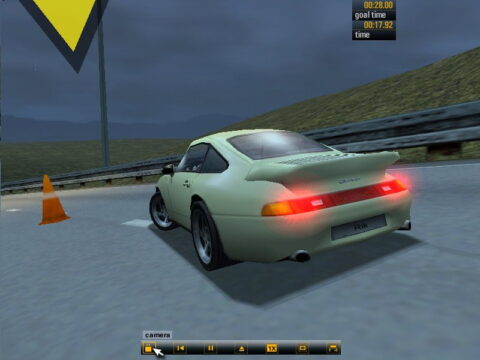
Need for Speed: Porsche 2000
Written by: Rik
Date posted: May 13, 2007
- Genre: Racing
- Developed by: Electronic Arts
- Published by: Electronic Arts
- Year released: 2000
- Our score: 8
As any Star Trek fan will tell you, the franchise is afflicted by a so-called ‘movie curse’, which seems to condemn all of the odd-numbered, big-screen Trek outings to be less well-received commercially and critically than their even-numbered counterparts. While I’m no Trek fan, and don’t really know enough about the movies themselves to make a judgement (although I have seen Insurrection, and that was pretty sucky) it’s safe to say that if there’s broad consensus among the billions of Trekkies out there then there’s probably something in it.
I mention this only because a similar curse seems to have befallen the long-running Need for Speed series – which, though popular, probably doesn’t attract similar levels of analysis, perhaps because it’s a series of racing games which allow the player to drive expensive cars as recklessly as they desire in a consequence-free environment rather than, er, whatever Star Trek is about. Nevertheless, as a follower of NFS since the original made the leap to PC from the 3DO, a pattern seems to have developed here, too, with the even-numbered games rarely impressing, only for the next odd-numbered one to be hailed ‘a return to form’.
This can largely be attributed to the fact that EA have sought to milk the series as much as possible by releasing a new game at the same time each year, FIFA style, and such a timetable demands that the ideas and technology behind the last decent game be rehashed for the following year’s release. The last NFS game we covered on FFG was Hot Pursuit, the third game in the series, which was released in 1998. A damn fine effort it was too, and, after some minor tinkering, it was cynically reheated and pushed out to the public in 1999 as Need for Speed: Road Challenge. For the time being, at least, we’re going to skip over that one – sure, it may seem lazy, but if EA can’t be bothered to put the effort in, then neither can we, frankly (okay, so we might do a full review at some stage [Edit: And we have – check it out here]).
All of which brings us to game number five in the series, Need for Speed: Porsche 2000, also known as Porsche Unleashed in the US, presumably on the back of some in-depth market research suggesting that Europeans would be wowed by the inclusion of the current year in the title, while Americans were more likely to be lured by the more explosive U-word. Anyway, both versions have ‘Porsche’ in the title, which would seem to indicate that EA signed some sort of deal with the German car giant to feature their brand rather prominently in the game. While this may have seemed like a great idea at the time, it was largely met with a dismissive shrug from the games-buying public, and Porsche 2000 remains one of the least commercially successful games in the series.
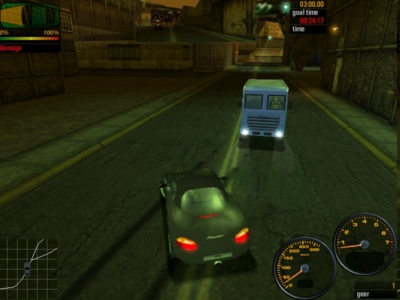
When you’re delivering cars, you can’t take any damage. Which makes it all the more annoying when a truck decides to veer towards you.
Personally, I can’t really understand why anyone would be particularly attracted to a racing game just because it had ‘Porsche’ (or any other maker’s name) stamped all over it. More than anything else, it seems like a deal of this nature restricts the developers in terms of what they can do with the game. In Porsche 2000, every car, bar the occasional bit of traffic, is a Porsche. You have to drive a Porsche, you race against other Porsches – even the police cars are Porsches – and those expecting more Cannonball Run-style races against other supercars are going to be disappointed.
Still, the Porsche deal does have some upsides, aside from the various video clips and bits of Porsche trivia dotted around, and it’s clear that EA were able to work closely with the car experts to make the performance and handling of the in-game vehicles more realistic this time around. While the end result is still firmly in the ‘arcade’ camp, the improvement in car handling over previous NFS titles is marked, with the hovercraft-esque steering of NFS 3 a distant memory. Surprisingly, Porsche haven’t been too precious about restricting the damage models, either. No longer do you bounce harmlessly off the scenery when you misjudge a corner, and such mishaps affect both the appearance and performance of your vehicle. Admittedly, this isn’t a first for the series (vehicle damage was included in Road Challenge) but it’s a nice surprise to find that it has been retained despite the close involvement of the manufacturer.
With all this in mind, the emphasis of the game has changed significantly. The police-baiting of Hot Pursuit has all-but disappeared, replaced by two lengthy single-player career modes, both of which have clearly been designed to test your ability to handle the vehicles at your disposal. The first of these is ‘Evolution’, which is essentially a trip through the Porsche history books. You start by racing Porsches of the 1950s, before progressing through the various ages to the more powerful modern models.
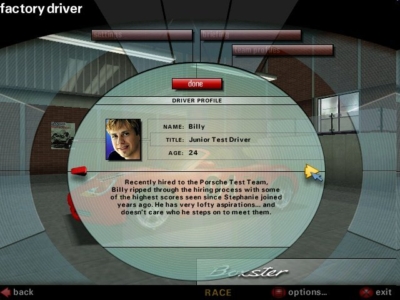
Each character in the Factory Driver mode has their own bio – Billy, for example, is the young hotshot douchebag who keeps challenging you to races – and losing.
Though it all sounds a little dull, it’s actually quite engaging, and although the early races amount to little more than a sedate country drive, the relatively sluggish performance of the vehicles means that mistakes are not easy to rectify and a certain amount of concentration is required to succeed. As you progress, you earn the money required to purchase later models and enter more challenging races, as well as upgrade your various cars to improve their performance. It’s a bit like Gran Turismo-Lite, providing you with the opportunity to build up a collection of vehicles over the course of your career, with bonus vehicles available should you complete certain challenges. You can also sell cars should you run short of money (each race has an entry fee, and you also need to repair your vehicles if they’ve sustained any damage between races) although this is extremely unlikely, as the game allows you to make a lot of money by simply buying used cars, repairing them and selling them for a profit. You’re provided with a seemingly inexhaustible supply of bashed up motors to purchase, and with a bit of patience you can build up a massive reserve of cash before you’ve got very far in the game at all, rendering the whole money system in the game largely redundant.
This error/oversight aside, the Evolution mode is a decent, if a little dry, slice of Porsche-on-Porsche racing. The other major single-player mode (and my personal favourite) is called Factory Driver, a story-based feature in which you take the part of a rookie test driver at Porsche and have to work your way up the ranks. The racing comes in the form of a variety of challenges, usually timed, which could be driving round cones out on the test track, pitting your skills against another test driver, or taking a customer out for a demonstration drive.
The challenges are sometimes a little bit contrived – would your boss really ask you to deliver a customer’s brand new Porsche as quickly as possible by driving recklessly through town and avoiding the police? (I’m guessing not, although as I’ve never ordered a new Porsche, I suppose this could be standard procedure) – but they are all nicely balanced, and despite the consistently high difficulty level, you always feel you can beat the game on the next go. The story itself is told through a series of text boxes prior to each new task, so thankfully there’s no awkward voice acting or cut-scenes, and is fairly standard stuff – you’re a rookie, you need to prove yourself, some of your colleagues are friendly, some of them aren’t – but it remains a good way of stringing the various challenges together.
All-in-all, Porsche 2000 represents something a little bit different for the Need for Speed series. Superficially it may resemble the two games that preceded it – though the graphics have been improved since NFS 3:HP, it’s still very much the same game engine – but much has been changed underneath. While NFS 3 is the kind of game you can dip into for a quick race, Porsche 2000 offers two lengthy and focused single-player career modes that can keep you entertained for longer periods. Though the disposable nature of racing games inevitably means that you won’t necessarily come back to it again and again, it remains one of the more solid and involving arcade racers of recent years.

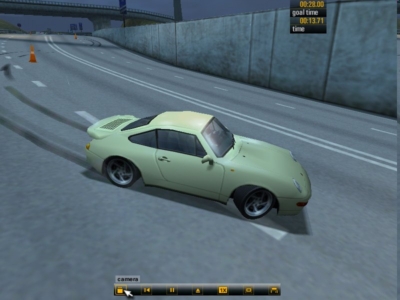
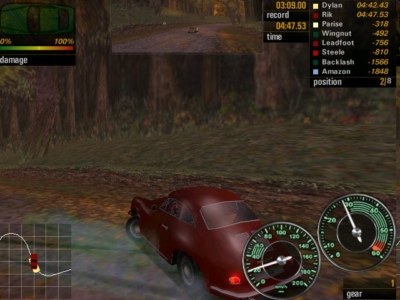

 Posts
Posts